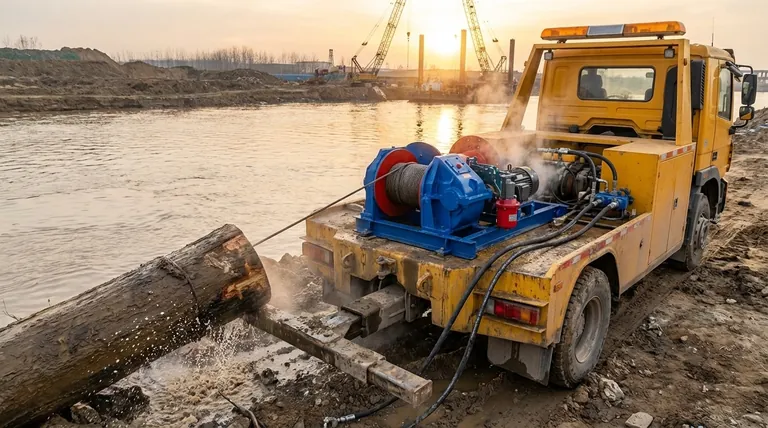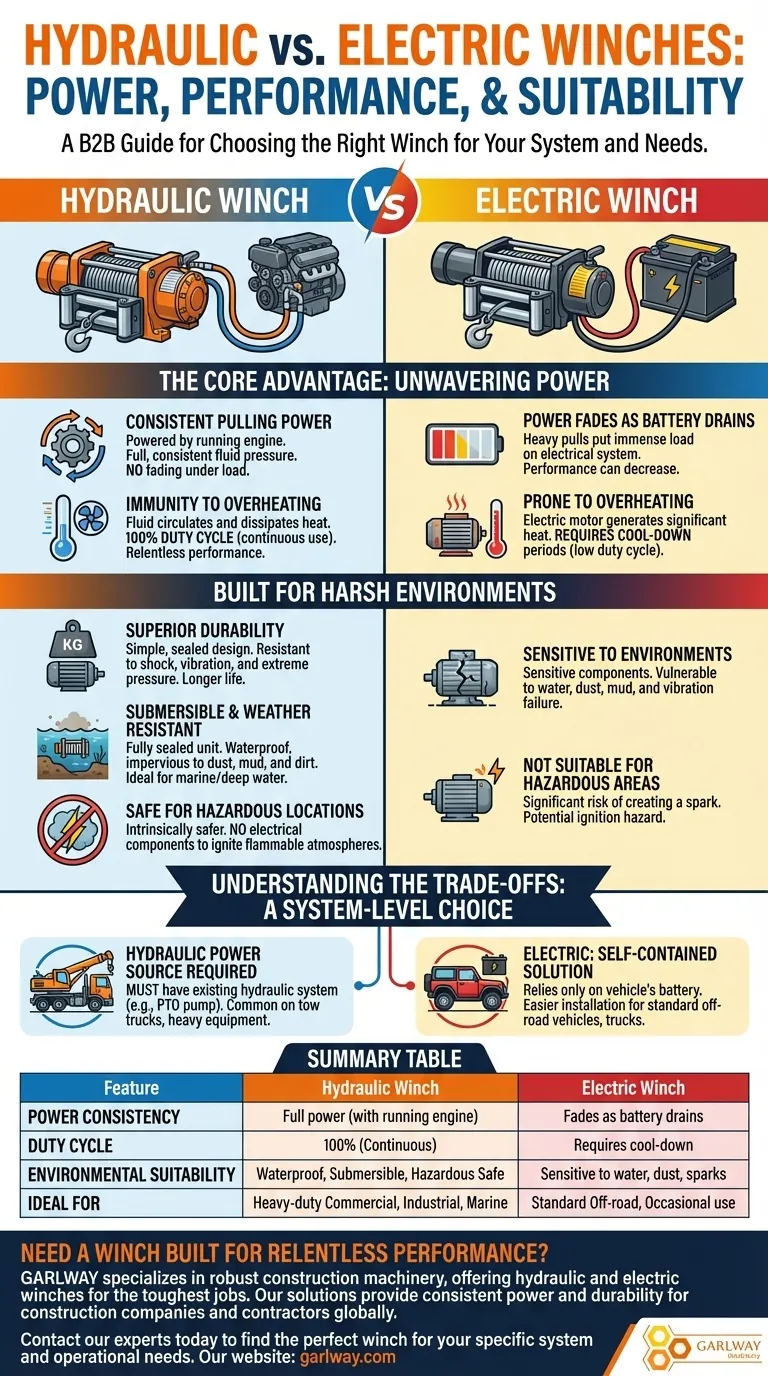The primary advantage of a hydraulic winch is its ability to deliver consistent, uninterrupted power for long durations without the risk of overheating. Unlike electric winches that rely on a battery and can lose power or overheat under heavy, continuous strain, hydraulic winches are driven by a running engine's hydraulic pump, ensuring relentless pulling capability for the most demanding industrial and commercial tasks.
The decision between a hydraulic and an electric winch is not about which is universally "better," but which is appropriate for the system you have. Hydraulic winches are a superior component for equipment that already has a hydraulic system; electric winches are a self-contained solution for vehicles that only have a battery.

The Core Advantage: Unwavering Power and Duty Cycle
The fundamental difference lies in how power is generated and sustained. An electric winch is a self-contained system drawing immense amperage from a battery, while a hydraulic winch is an integrated component of a larger hydraulic circuit.
Consistent, Unstoppable Pulling Power
An electric winch's pulling power can decrease as the vehicle's battery drains. A heavy pull puts an enormous load on the electrical system.
A hydraulic winch, however, is powered by a hydraulic pump connected to a running engine. As long as the engine is running, the winch receives full, consistent fluid pressure, ensuring it can pull at its maximum rated load without fading.
Immunity to Overheating
The single greatest limitation of an electric winch is heat. Its electric motor generates significant heat under load, requiring cool-down periods during long, difficult pulls. This is known as a low duty cycle.
Hydraulic systems are designed to manage heat. The hydraulic fluid itself circulates and dissipates heat, allowing the winch to be operated continuously for extended periods without damage or performance loss. This gives them a 100% duty cycle.
Built for the Harshest Environments
Hydraulic winches are engineered for reliability in conditions where failure is not an option. Their design inherently protects them from environmental hazards.
Superior Durability
Hydraulic winch motors are generally simpler and more robust than high-amperage electric motors. They are sealed systems designed to operate under immense pressure.
This robust construction makes them highly resistant to shock, vibration, and the rigors of industrial use, leading to a longer operational life under heavy strain.
Submersibility and Weather Resistance
Because a hydraulic motor is a fully sealed mechanical unit powered by fluid, it is inherently waterproof and impervious to dust, mud, and dirt.
This makes them the default choice for marine applications, deep water recovery, and extremely dirty environments where an electric motor's sensitive components would quickly fail.
Safe for Hazardous Locations
In environments with flammable gases or materials (like mining or oil and gas), an electric motor poses a significant risk of creating a spark.
Hydraulic winches are intrinsically safer for these hazardous locations because the winch unit itself has no electrical components that could ignite the atmosphere.
Understanding the Trade-offs: It's a System-Level Choice
Choosing a hydraulic winch is not a simple upgrade; it's a decision based entirely on the power system of the host vehicle or equipment.
The Need for a Hydraulic Power Source
The most significant limitation is that a hydraulic winch cannot function on its own. It requires a host machine with an existing hydraulic system, typically a power take-off (PTO) pump driven by the engine.
This is why they are common on tow trucks, tractors, and industrial equipment but are impractical for standard off-road vehicles or trucks that lack this system.
Installation Complexity
Installing an electric winch involves running heavy-gauge wires to a battery. Installing a hydraulic winch is a more complex plumbing job, requiring high-pressure hoses, control valves, and integration with the existing hydraulic pump and reservoir.
Potential for Fluid Leaks
As with any hydraulic system, there is a risk of fluid leaks from hoses or fittings. A leak can disable the winch and create an environmental mess, requiring a different type of maintenance vigilance compared to an electrical system.
Making the Right Choice for Your Application
Your decision should be dictated by your equipment's capabilities and your operational needs, not by a simple comparison of power ratings.
- If your primary focus is continuous, heavy-duty commercial use: A hydraulic winch is the only viable option due to its 100% duty cycle and consistent power.
- If your primary focus is operating in hazardous or submerged environments: The sealed, non-sparking nature of a hydraulic winch provides unmatched safety and reliability.
- If your primary focus is self-recovery for a standard off-road vehicle or occasional use: An electric winch is the more practical, cost-effective, and easily installed solution.
Ultimately, choose the winch that matches the power system you already have and the duty cycle you truly need.
Summary Table:
| Advantage | Hydraulic Winch | Electric Winch |
|---|---|---|
| Power Consistency | Full power as long as engine runs | Power can fade as battery drains |
| Duty Cycle | 100% (continuous use) | Requires cool-down periods |
| Environmental Suitability | Waterproof, submersible, safe for hazardous areas | Sensitive to water, dust, and sparks |
| Ideal For | Heavy-duty commercial, industrial, marine use | Standard off-road vehicles, occasional use |
Need a winch built for relentless performance?
GARLWAY specializes in robust construction machinery, offering hydraulic and electric winches designed for the toughest jobs. Our solutions provide the consistent power and durability that construction companies and contractors globally depend on.
Contact our experts today to find the perfect winch for your specific system and operational needs.
Visual Guide

Related Products
- Electric and Hydraulic Winch for Heavy Duty Applications
- Hydraulic Concrete Mixer Machine Cement Mixing Equipment for Mixture Concrete
- JDY350 Electric Hydraulic Mortar Mud Concrete Mixer
- Small Electric Winch 120V and 240V for Compact Applications
- Electric 120V Boat Winch by Badlands
People Also Ask
- What are the differences between electric and hydraulic winches? Choose the Right Winch for Your Job
- What are the advantages of using an electric winch? Effortless Control & Superior Power
- How do electric hoists contribute to reducing worker fatigue? Boost Productivity & Safety
- What are the characteristics of windlass-style anchor winches? Maximize Your Anchoring System
- What equipment should be checked before winching? Ensure a Safe and Successful Recovery
- How does an anchor winch benefit fishing activities? Maximize Your Catch with Effortless Spot-Hopping
- How heavy of a winch do I need for my boat? Get the Right Capacity for Your Trailer or Anchor
- What are capstan electric winches and their applications? Master Long-Distance Pulling



















